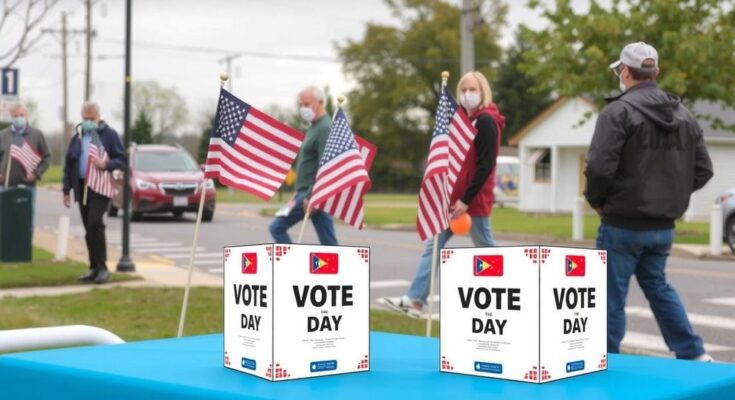On Tuesday, Loudoun County and central Virginia will hold special elections for two state senate seats and one House seat, with significant implications for party control in Virginia. Republicans aim to flip Democratic-held seats despite predictions of low turnout. Key candidates include Democrat Kannan Srinivasan and Republican Tumay Harding for the Senate race in Loudoun. The elections may influence Governor Youngkin’s legislative agenda before the General Assembly session begins.
On Tuesday, voters in Loudoun County and parts of central Virginia are set to cast their ballots in three special elections, determining two state senate seats and one seat in the House of Delegates just before the commencement of the General Assembly session. The Republican Party aims to gain control over both the state House and Senate by winning the contested Loudoun seats, although many political analysts consider such an outcome unlikely due to the region’s Democratic stronghold.
Conversely, Democrats face limited prospects of increasing their influence in the Senate, particularly with regard to the seat vacated by McGuire, which is situated in a predominantly rural and Republican-leaning area. Despite predictions of low voter turnout, special elections often produce unexpected results, making these contests particularly significant for the incoming GOP administration of Governor Glenn Youngkin in his final year in office.
Currently, Democrats hold a slight majority in both chambers, with a 21-to-19 advantage in the Senate and a 51-to-49 lead in the House prior to the resignation of Delegate Kannan Srinivasan, who is running for the Senate. Should Democrats fail to secure Srinivasan’s seat, they risk losing legislative control, given that the Republican Lt. Gov. Winsome Earle-Sears could decisively influence any tie votes due to her presiding role.
Polls for these elections will be open from 6 a.m. to 7 p.m., following an early in-person voting period that has concluded for both the Loudoun and central Virginia races. In the Loudoun Senate race, Srinivasan, a former House member focused on healthcare, consumer protection, and legislative efficiency, is challenged by Harding, an outspoken critic of Loudoun’s public school policies and advocate against progressive reforms.
The House seat vacated by Srinivasan is being contested by Democrat JJ Singh and Republican Ram Venkatachalam. Singh, a proponent of abortion rights and climate change policies, contrasts sharply with Venkatachalam’s focus on economic issues and conservative values. Meanwhile, in the central Virginia race to succeed McGuire, Cifers represents the GOP against Democrat Trammell, who has a platform steeped in rural development and education initiatives.
In summary, these special elections reflect both parties’ strategic efforts in a politically polarized environment, with implications that could influence future legislative decision-making in Virginia. The outcomes may enhance or diminish Governor Youngkin’s capacity to advance his agenda in the upcoming legislative session.
The special elections in Loudoun County and central Virginia represent a critical juncture for both the Republican and Democratic parties, occurring on the eve of the General Assembly session. The stakes are particularly high for Republicans looking to challenge Democratic control in historically blue areas, while Democrats aim to maintain their fragile majority, especially in the Senate where a seat vacancy could shift the balance of power. These elections are influenced by the increasing polarization in Virginia politics, making voter turnout and the results of these contests more unpredictable. As voters head to the polls, the candidates’ positions on key issues such as abortion rights, education, and economic policies illustrate the broader ideological battles taking place not just locally, but across the state, highlighting the significance of these races in shaping legislative priorities moving forward.
The outcomes of the special elections in Loudoun County and central Virginia carry substantial implications for the political landscape of Virginia. With Republicans vying for key legislative seats, the potential for shifting control in the state legislature will affect the governance priorities of the administration of Governor Youngkin in its concluding year. As both parties stake claims on various issues, the results could set the groundwork for future electoral strategies and policy formulations, particularly in the context of Virginia’s contentious political climate.
Original Source: www.washingtonpost.com




